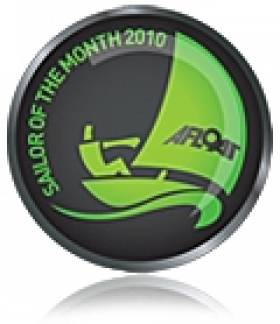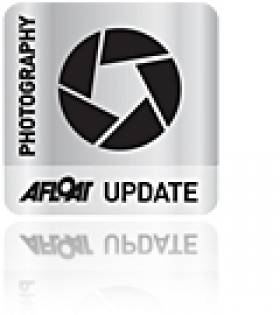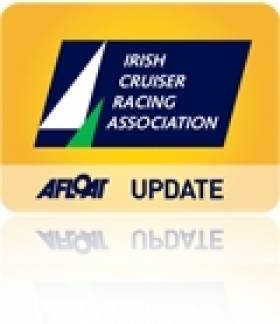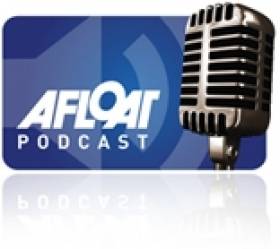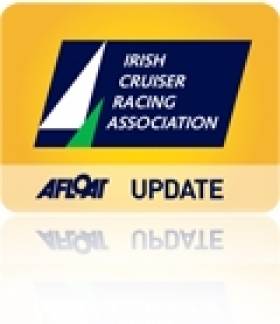Displaying items by tag: ICRA
South Africa Enters Commodores Cup Fray
There are only a few weeks to the close of entries at this year’s Rolex Commodores’ Cup and Ireland's team is building up speed at Cork week this morning, using the home event as a warm up for August. Whilst most teams have finalized their boats and crews, others are still engaged in discussions to determine their line-ups. For all teams, both settled and prospective, certain things are set in stone. Most importantly there must be three boats, one in each of the stipulated rating bands, and, all teams must be on the starting grid for the first race on Sunday, 15 August. At present, organisers’, the Royal Ocean Racing Club are expecting 11 teams representing France, Ireland, Hong Kong, South Africa and the United Kingdom to contest the international trophy. The shaping field looks to be as competitive as ever. The sea battles that have been fought in recent weeks off the coasts of France and Ireland, and, of course, on the event venue waters of the Solent suggest that a no quarter given epic is in the making. Neutrals, with an eye for the outsider, are likely to follow the progress of the South African team over the course of the Rolex Commodores’ Cup. 2010 marks the first time a team from the world’s second largest continent has participated. As with Hong Kong’s presence in 2008, for this to happen a number of stars have had to be in alignment. According to Mike Bartholomew, skipper of the team’s Class 2 yacht, the King 40 Tokoloshe, “it was Eddie Warden Owen from the RORC who actually suggested to Rick Nankin and myself that we should consider putting a South African team together.
The whole thing really just grew from there. We approached two others we knew well, Phil Gutschi and Rick Garratt, to see if they could join the party. Both were enthusiastic from the word go.” Gutschi owns the Landmark 43, Windpower, to be skippered by Nankin in Class 1, and Garratt has chartered the J-109, Zelda, to be skippered by Dave Hudson in Class 3.
The second catalyst, in Bartholomew’s opinion, has been having a South African owned yacht (Tokoloshe) eligible for the Rolex Commodores’ Cup sailing in the Solent for the past two years, “previously it would have been too much of an ask to put a team together and, in any event, there were not any really competitive boats in South Africa.” Bartholomew is being modest about Tokoloshe’s sailing. She has not just been competing, but has proved a force to be reckoned with in recent months, going head to head with some success against other Rolex Commodores’ Cup contenders on the Solent circuit. The vast majority of the crews will be South African, easily meeting the strict eligibility criteria for the event, “most of the individuals are from Cape Town.
Even Phil, who is from Port Elizabeth, keeps his boat there. The main exceptions are the navigators, Andrew Cape on Windpower and Rick Oswald on Zelda, and, of course, some of the regulars on Tokoloshe.” Experience is essential for a good result at the Rolex Commodores’ Cup. Not necessarily just time on the waters of the venue, but in competing over a tight, but demanding series. Bartholomew is unconcerned by this aspect, “there is a fair amount of experience in the crews most of whom have had international exposure. Phil has campaigned a number of boats over the years. His skipper Rick Nankin is probably by far the most experienced South African in the mix. But Rick Garratt still remembers the good times of the 1995 Admirals Cup. He will have aboard Mark Sadler, the skipper of Shosholoza the South African entry in the previous Americas Cup.” All three boats will be in UK waters by Cowes Week and will use that regatta as a final serious warm-up. One final element in the list of irresistible forces was the involvement of the Race Ahead project. David Hudson and his brother Roger have been part of the sailing scene for almost all their lives, and, both are very successful sailors in their own right. In 2008 they created 'Race Ahead', a project aimed at giving South Africa's young sailing talent a structured route into the international sailing world.
The project has allowed young South Africans to compete in the highly competitive Laser SB3 circuit in the UK and Ireland. The effort has not been without reward: a top 10 overall finish at Cowes Week; followed by a class win at Cork Week and a second overall at the inaugural Laser SB3 World Championship in Dublin. For Garrett to have access to this pool of talent was a major motivating factor in his participation. Just like Hong Kong, the South African team is not just coming along for the ride. Bartholomew is succinct on this point, “we will try to win.” The 2010 Rolex Commodores' Cup will be held off Cowes, Isle of Wight, from 15 to 21 August. Nationality At least 50%... of the crew of each boat on board in any race shall comprise individuals who are Nationals of the country of the relevant team or individuals who have had since 1 August 2009 had their principal residence in that country or individuals who were born in that country. Further information about the Rolex Commodores' Cup may be found at: www.rorc.org
Tiger Takes Howth Yacht Club IRC1 Class
HOWTH YACHT CLUB, WEDNESDAY SERIES 2 (RACE) 07/07/2010 Class 1 IRC: 1, Tiger Hughes/Harris; 2, Storm P Kelly; 3, Joslim J Connolly; Class 1 HPH: 1, Joslim J Connolly; 2, Tiger Hughes/Harris; 3, Storm P Kelly; Class 2 IRC: 1, Dux A Gore-Grimes; 2, Toughnut D Skehan; 3, King One D Cullen; Class 2 HPH: 1, C'est la Vie Flannelly/Others; 2, Mac Magic P & D McCabe; 3, Toughnut D Skehan; Class 3 IRC: 1, Starlet Bourke/Others; 2, Drumbeat F & F Magann; 3, Sunchaser M Marr; Class 3 HPH: 1, Lee na Mara R O'Malley; 2, Drumbeat F & F Magann; 3, Starlet Bourke/Others; White Sails HPH: 1, Cogar K & C Halpin; 2, Fanatix R Fanning; 3, On the Rox C & J Boyle; White Sails IRC: 1, Alphida H Byrne; 2, Bite the Bullet C Bermingham; 3, Fanatix R Fanning
Dave Dwyer is 'Sailor of the Month' for June
Dave Dwyer of Cork is the Afloat.ie/Irish Independent “Sailor of the Month” for June with his convincing retention of the British Open IRC Championship over three days of racing which concluded in the Solent on Sunday June 27th.
A busy month of sailing had already produced several worthy contenders for the Sailor title. But Dwyer’s performance on the final weekend with the 39ft Marinerscove.ie (designed in 2006 by current Sailor of the Year Mark Mills of Wicklow) was in a league of its own.
The boat has of course been regularly updated and optimized during four busy years at the sharp end of national and international fleets. But even in these recessionary times, there are completely new and decidedly hot contenders coming on the scene,
Thus even as the Dwyer team – and it’s a formidable equipage - was shaping up for the Solent championship, right on Mills’ own doorstep in Wicklow it was being confirmed that the overall winner of the Round Ireland Race 2010 was the 46ft Tonnere de Breskens, designed by Jason Ker in 2008.
To add to the pain, second place went to another 2008 Ker boat, the 39ft Inis Mor (Bernard Gouy, Clifden Boat Club). In fact, there wasn’t a Mills design in the entire round Ireland fleet. But within four days, marinerscove.ie had done the business and redressed the balance against an international lineup off Cowes, clinching it with four wins on the final day of racing, and catapulting Dave Dwyer into Irish sailing’s kingpin spot for June.
More from W M Nixon on Dwyer's performance in today's Irish Independent here.
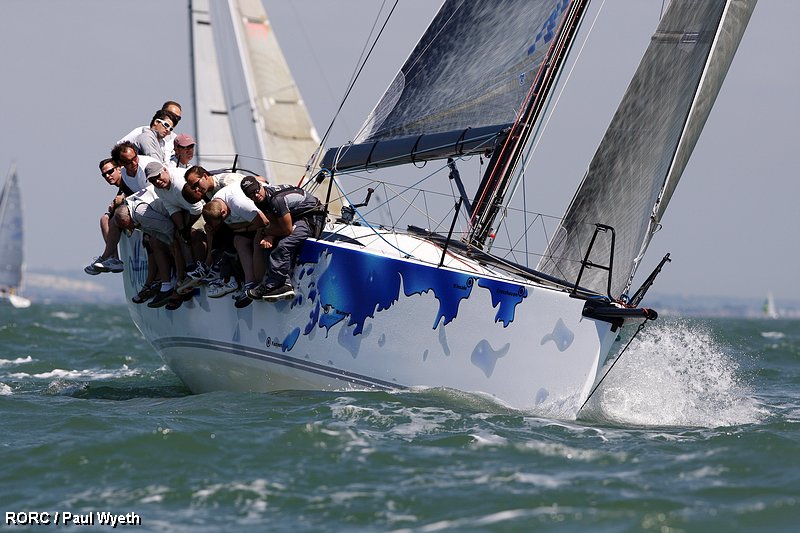
Dave Dwyer's Marinerscove in winning form on the Solent. Photo: Paul Wyeth
WIORA 2010 Regatta Photos from Kilrush here!
On the gallery are the latest images from Gareth Craig of Fotosail from the West of Ireland Offshore Racing Association (WIORA) Championships being sailed on the Shannon Estuary. Click HERE to go the gallery.
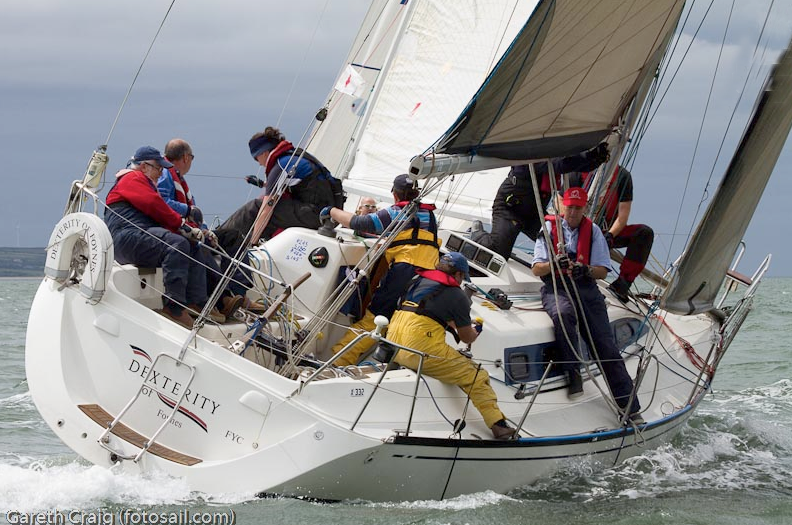
Marinerscove Retains UK Title on the Solent
Cork's Marinerscove.ie (Dave Dwyer) has been declared RORC IRC National Champion, successfully retaining the title, a feat only ever achieved once before by Justin Slawson’s Big Cheese in 2001. Louay Habib Reports.
The tension was mounting at the start of the final day of the RORC IRC National Championship. The international fleet from Belgium, France, Great Britain, Hong Kong, Netherlands and South Africa were waiting to act out the final chapter of the championship. The seabreeze kicked in from south west at about 1100 and the fleet got into race mode for the last two races of the championship.
During the day, the southwesterly built from a wispy six knots to a stiff sixteen knots with wind over tide, giving the Western Solent some degree of swell; truly sublime racing conditions.
There were dramatic scenes right from the off with a bevy of boats infringing the start line of Race 7. Johnny Vincent’s TP52, Pace, was called over the line and got back smartly to not only recover but to win Race 7. In IRC One there were no less than five boats hauled back to restart.
The RORC IRC Super Zero title was won by Charles Dunstone’s highly impressive TP52, TEAMORIGIN Rio. Volvo Ocean winner, Jules Salter, who is currently navigating with Emirates Team New Zealand, was in the afterguard and he had this to say after their win: “It was great to be back sailing in the Western Solent, I can see my house from there! It is a place that I really call home. The tides are pretty well documented but reading the effects on the wind created by the tide is always a challenge, one that I really enjoy, it is a pleasure to sail with Charles and I count many of the crew as good friends.”
In IRC Zero Glynn Williams’ Swan 45, WISC, was four points off the lead overnight. WISC took up the challenge, nailing the start of Race 7 and battled all the way to the finish taking the bullet by less than 30 seconds on corrected time. IRC Zero went to the wire. Going into the last race, WISC was level on points with Nick Burns and Fred Kinmouth’s King 40, EFG Bank Mandrake.
John Shepherd’s Ker 46, Fair Do’s VII, won the last race of the day but WISC clinched the IRC National title for Class Zero after coming home in second place.
‘It is a big, big, big, win,” declared Glynn Williams. “When we saw the fantastic opposition in the fleet, our expectation before the start was top four, so to come here and win is very satisfying indeed. Kevin Sproul did a marvellous job at the back, as he always does but the whole crew should be congratulated; there is not a gram of emotional baggage on board, they are all a pleasure to sail with.”

In IRC One Dave Dwyer’s Mills 39, Marinerscove.ie, continued their relentless onslaught, notching up win number four in Race 7. Peter Rutter’s Grand Soleil 43, Quokka 8, was a solid second but a battle went to the wire for third place between four boats who will be racing in the Rolex Commodores’ Cup: Christopher Opielok’s Corby 36, Rockall III, Robert Davies’ Corby 36, Roxy 6, and Philippe Delaporte’s J 122, Pen Azen. In the last race Rockall III overhauled their rivals to clinch third place.
Marinerscove.ie was also declared overall RORC IRC National Champion. Successfully retaining their title, a feat only ever achieved once before by Justin Slawson’s Big Cheese in 2001.

Andy Beadsworth has a long association with David Dwyer and had this to say at the prizegiving: “Before the championship we decided that we would judge our performance by how well we sailed rather than the result and that still stands. I believe that we covered the basics well and got our risk strategy right. The crew work has improved since we won last year and a lot of that is down to a determined effort by everyone on board to reach and maintain a high standard of boat handling. That has enhanced our boat speed which is a crucial area in any kind of yacht racing. Marinerscove.ie is in great shape for the Rolex Commodores’ Cup.”
Chris and Hannah Neve’s, No Chance, has had a cracking championship and blew the opposition away with a bullet and a second to take the IRC Two title by a healthy margin. It was evident why they have been chosen to represent England for the forthcoming Rolex Commodores’ Cup. No Chance was also awarded the Jackdaw Trophy for second best yacht overall in IRC.
“Overwhelmed, it’s absolutely fantastic to win against such high class opposition, we are so up for the Rolex Commodores’ Cup,” declared a delighted Hannah Neve.
In IRC Three Louise Morton steering Anchor Challenge was first in class beating two other Quarter Tonners; James Morland’s Menace and Mark Lees’ Espada, into second and third respectively.
Louise was not sailing her usual boat Espada but her sistership Anchor Challenge, which is usually sailed by Peter Morton who was on duty with TEAMORIGIN Rio.
“We are obviously delighted with the win and it was great to sail Anchor Challenge, we decided to sail her because she is a far more tweaky boat than Espada with additional systems such as halyard locks but I feel that the greater sail area is more suited to the boys, who weigh a fair bit more than the my all girl crew.”
Racing continues for the Royal Ocean Racing Club, on Friday 2nd July with the 164 mile Cowes – Dinard – St Malo Race in association with UNCL, Yacht Club de Dinard, Société Nautique de la Baie de St. Malo and the Royal Yacht Squadron as part of the RORC Season’s Points Championship.
One of the most competitive fleets ever assembled enjoyed some spectacular sailing conditions (as Paul Wyeth's photos over the fold show) on the first day of the 2010 RORC IRC National Championship writes Louay Habib.
Charles Dunstone’s TP52, Team Origin Rio, had a perfect start to the championship, scoring three straight bullets in IRC Super Zero. “Rio just lights up in these conditions; it was absolutely fabulous out there today,” commented Charles Dunstone after racing.
There was an intense battle on the water in IRC Zero. Hong Kong’s Rolex Commodores’ Cup big boat, Mills 40, EFG Bank Mandrake, is in pole position after three races. Joint owner, Nick Burns had this to say dockside: “That was pretty hot racing out there. Great fun and fantastic stuff. We were delighted to take two wins but our disappointing last race has left us a bit perplexed. We seemed to lose boat speed upwind and downwind. Perhaps we picked up something on the keel but we really don’t know what the issue was.”

In IRC One reigning RORC IRC National Champion Dave Dwyer’s Mills 39, Marinerscove.ie, got off to a great start winning the first two races, but the last race of the day did not go according to plan. Tactician Andy Beadsworth explains: “The first two races went well for us, we sailed our own race and as the fastest boat in the class we could go our own way but it all went wrong in Race Three. We were too eager at the start and with close to three knots of tide we were over the line and had to go back. After that we misjudged a port-starboard and ended up doing penalty turns. However the recovery was good and we managed to claw our way back through the traffic for a third place.”
Marinerscove.ie leads IRC One after the first day. Peter Rutter’s Grand Soleil 43, Quokka 8, is in second place with Robert Davies’ Corby 36, Roxy 6, in third.
In IRC Two, Marc Alperovitch and Jerome Huillard’s A 35, Prime Time, had a disappointing first race but it was all smiles for the French team after that with two bullets to end the day top of the class leader board. Chris and Hannah Neve’s First 35, No Chance, is lying second over night with Steve Northmore’s A35, Waterjet.co.uk, in third place.
IRC Three may be the smallest class at the championship but virtually the entire class enjoyed a very close squabble in the western Solent. Mike and Jamie Holmes’ J 97, Jika Jika, came out on top after three races. James Morland’s Quarter Tonner, Menace, slipped up in the last race of the day but holds onto second place. Louise Morton’s Quarter Tonner, Anchor Challenge, has a very consistent day and is lying third.
Three races are scheduled for the second day of the Championship today. All of the competitors will be hoping for another fantastic day’s racing in the Solent.
Full results from Day One of the RORC IRC National Championship can be found at www.rorc.org






Perfect Conditions on Day Two of ICRA Nationals
Blue skies coloured Dublin Bay again yesterday with a sea breeze of 12 knots providing perfect sailing conditions for the ICRA Nationals, writes Claire Bateman. The results illustrate the closeness of the competition in most divisions. Anthony O’Leary in Antix is leading IRC 0 after five races and indeed had the unusual situation today of having a tied result with Dave Dwyer’s Marinerscove.ie on corrected time each receiving 1.5 points in Race four. This is keeping it very much in the O’Leary family as it is Anthony’s son Nicholas is helming Mariners cove. Antix is very much the dominant force in Class zero, discarding a fifth after yesterday's racing to leave her with four wins on the scorecard.
ICRA members will be interested to know that Mariners had a better day scoring a total of 4.5 from the three races and as the defending champion is now a mere three points adrift of the leader. It is great to see Peter Rutter’s Quokka 8 competing and he is now lying third on 17 points.
In Class One IRC the O’Higgins Rockabill V appears to be walking away with the series having scored three wins and two seconds leaving him with seven points. Currently following on Rockabill’s heels, is a plethora of J109s led by J.Maybury’s Joker 2 followed by Jalapeno and Jelly Baby. However, should there be a discard tomorrow Jelly Baby could come up the leader board and it is all to play for here.
In Class Two IRC the pre race favourite, Kinetic, the Colwell/Murphy well sailed Corby 25 and defending title holder, has built up a good lead and is currently on 12 points followed by Denis Coleman’s Corby 25 Thunderbird from Cork with Anthony Gore Grimes in the X302 DUX just one point adrift. Things are very tight with the top two boats in Class Three IRC with just one point separating the current leader the O’Brien, Kenefick and Kenefick, Tiger, from the defending title hoilder Flor O’Driscoll in his J24 Hard on Port.
Currently lying third is Supernova and it most def initely is all to play for in this class.
In the Non Spinnaker Division Five IRC four races have been sailed and they have already received a discard. Counting the discard and leading on 4 points is Tsumnai, one point ahead of Orna followed by Lula Belle on 7 points.
In the Non Spinnaker Division 6, again with one discard applied, the Howth Yacht Club Dehler 34 Voyager is on four points, two points ahead of fellow HYC yacht Brazen Hussy, and a Welsh raider from Pwllheli SC, Mojito, who is on equal points with Brazen Hussy.
In Class 0 ECHO Marinerscove.ie continues to hold her lead followed by Tiamat and Antix respectively. In Class One ECH0 Rockabill V leads Joker 2 with Donal O’Leary’s D- ‐Tox in third position. In Class Two ECHO Kinetic leads Thunderbird Page 2 followed by Indigo who is on equal points with Thunderbird. Class Three ECHO has very tight results to date at the top with only one point separating the leading three boats.
The current leader is Jibberish on 33 points, followed by Tiger and Supernova both on 34 points. However, it is Tiger has the more consistent results which could stand to her in the case of a discard. Class Five ECHO Adelie is on 7 points, Lula Belle also has 7 points and the Sigma 38 Persistance is just one point adrift on 8 points. Class 6 ECHO is currently led by Voyager on 5 points followed by Brazen Hussy on 7 points and Mojito on 8 points.
A lot at stake for today in many classes.
Liebherr Cruiser Nationals - from the dock
In this week's Afloat podcast, Markham Nolan hits the pontoons of the Royal St George to get a glimmer of how the first day of the ICRAs kicked off.
This morning's opening race of the Liebherr 2010 ICRA National Sailing Championships has kicked off in style on Dublin Bay and although the 120 boat fleet (drawn from 20 clubs) was shrouded in a sea mist for a time race course reports indicate tight racing in southerly breezes of over 10 knots.
Jump Juice in Division Zero damaged her pulpit and at one stage was dealing with a man over board. They have reired from today's racing. A lady crew member from another boat has been brought ashore with two borken teeth.. More updates as we have them. Photos from the race course are on our gallery now.
All classes are underway. Divisions Zero and One have two round the can races, and Divisions two and and three have three windrward leeward races today. the white sail fleets have two round the can races. The fleet is expected back ashore around 4pm.
Photos from this mornings racing by Bob Bateman are already on the Afloat gallery here.





























